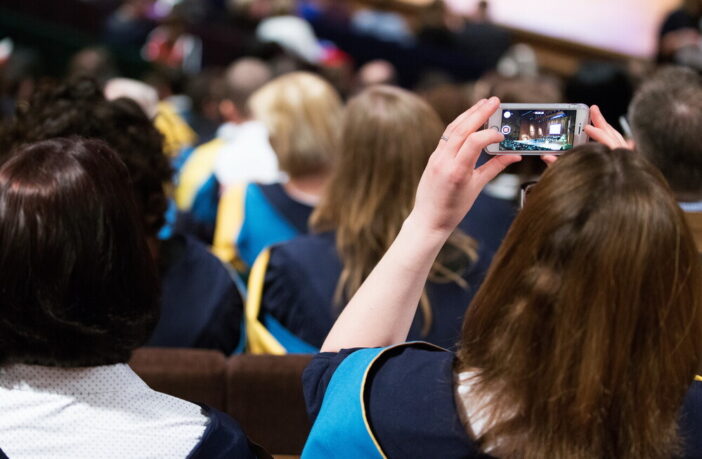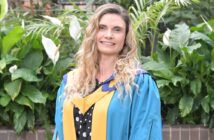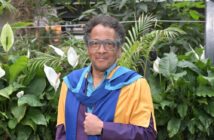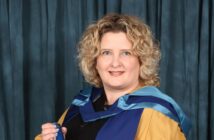Three individuals who have devoted their lives to diversity and inclusion were given honorary doctorates by The Open University recently for their work.
Since 1973 the OU has awarded more than 1,100 honorary degrees to people who have given back to their communities and beyond.
This time it was the turn of Jennifer Dyer, Asif Sadiq MBE and Yves Bonavero to walk across the stage at London’s Barbican to applause for the work in their field from graduating students.
The Open University (OU) is both proud of its efforts to promote inclusion, and is conscious of its responsibility to keep making progress so shining a light on their work is particularly fitting.
Jennifer Dyer, Master of the University 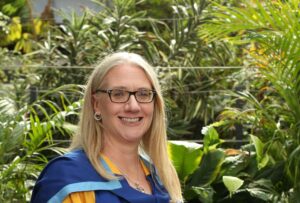
The first of the trio to take to the stage was Jennifer Dyer, who has held roles in higher education and local government before focusing on inclusion in education.
As policy director at Skill, the National Bureau for Students With Disabilities she worked to improve access and inclusion in further and higher education.
She then became a consultant for Action on Access, which promotes widening participation in HE, and then became head of diversity at the Institute of Physics.
Building on her previous experience, Jennifer led pioneering work to open up physics to people with disabilities, resulting in a ground-breaking report on inclusive teaching and learning.
Working with partners at the Royal Society of Chemistry and the Royal Astronomy Society, she also developed an innovative survey of lesbian, gay, bisexual and transgender scientists to understand their challenges and experiences, creating a benchmark from which to drive change.
She also spearheaded the development of Project Juno – the programme that recognises and rewards physics departments that promote and support gender equality, of which the OU is currently the holder of a Project Juno Champion award.
“You can’t be what you cannot see”
Now Jennifer is head of diversity and inclusion at the Royal British Legion. She said:
“In the diversity world we often say you can’t be what you can’t see, which is why we need places like The Open University with its commitment to inclusion and it’s richly diverse communities so that everyone here can see what they can truly be.”
She said it was particularly true of space science and physics where organisations needed to harness a true diversity of passion and creativity to find answers to some of the biggest questions we still have about our universe.
She added:
“We all deserve the opportunity to belong and it is incumbent on all of us to ensure that everyone around us feels that they can belong too.”
Asif Sadiq, Doctor of the University
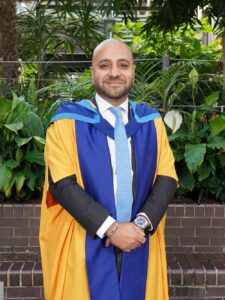 Asif began his career as a police officer, focusing on the importance of creating a diverse police force to best serve London’s multicultural population.
Asif began his career as a police officer, focusing on the importance of creating a diverse police force to best serve London’s multicultural population.
He was raised in Nairobi and came to the UK to study where he gained a degree in management and human resource management.
There followed a role as head of the Equality, Diversity and Human Rights unit at the City of London Police and presidency of the National Association of Muslim Police, then President of the National Police Staff Support Network.
After a more than a decade in the police force, in which he specialised in preventing and tackling hate crimes, Asif stepped into the private sector in 2016 as head of diversity and inclusiveness for EY, considered one of the ‘big four’ accountancy services firms in the UK and one of the largest professional services networks in the world.
He has since gone on to senior leadership roles in a series of influential global organisations, including The Telegraph, Reebok and Adidas.
Recognising the value of failure
Today, he is chief diversity, equity and inclusion officer at Warner Brothers Discovery, the global media and entertainment business. Other high profile advisory roles have followed and today he is still in touch with his policing roots as he is a special sergeant with the City of London police.
Following acceptance of his Doctorate of the University he said it was a “great honour” to receive the award and that 25 years ago, when he started out on his role of promoting diversity “it wasn’t even a career”.
He urged the audience to recognise the value of failure: “No one talks about failure and the amount of times you fail.”
He said failure should not be seen as a negative thing:
“Failure teaches us. What is really important is how quick we get up from failure and try again.” He argued that failure was the “fundamental argument in success”.
Yves Bonavero, Doctor of the University
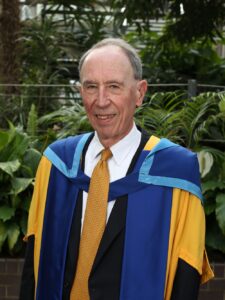
Paris-born successful businessman Yves Bonavero was made a Doctor of the University for his tireless work as a champion of human rights and social inclusion.
The former group CEO of ED&F Man, one of the world’s leading suppliers of agricultural products known as “soft commodities”, he founded a series of international businesses in property development, logistics and distribution, consulting and capital management, including Woodsford Group Ltd, which holds businesses to account for breaches of Environmental, Social and Governance standards.
Then in 1990, he and wife Anne, founded the AB Charitable Trust to promote human dignity, human rights and social inclusion for the most marginalised groups in society.
Since then, the Trust has distributed more than £33m, making it one of the UK’s leading grant-making organisations.
On becoming Doctor of the University, Yves, who holds a first-class degree in Philosophy and German from the University of Oxford, said it was a “joyful day” to be with the graduates.
He said he was “honoured, humbled and above all delighted” to be sharing the stage with them and started a round of applause not just for them but their supporters, too.
Social mobility and justice
He went on to say The Open University was a dream come true “a dream of social mobility and social justice; a dream of opportunity for all; a dream born from the beliefs that the right for each and every student to access education is a fundamental human right”.
He said this human right was “trampled under foot in many countries” and how in those countries, including Afghanistan, girls and women were denied an education.
He said that violated international human rights treaties and that we should all care because, according to the International Criminal Court, gender discrimination, which specifically includes depriving a person of the right to education, was a crime against humanity.
